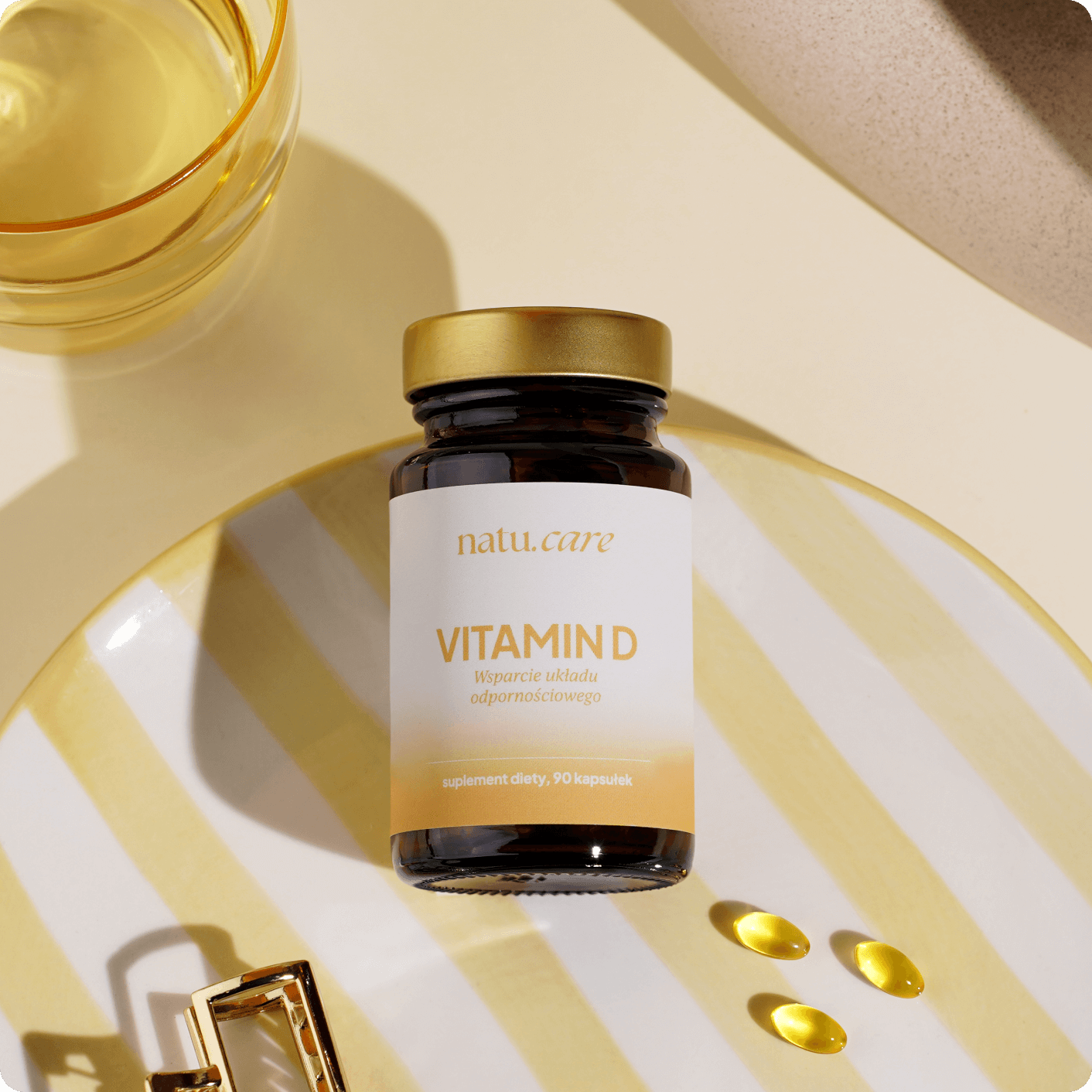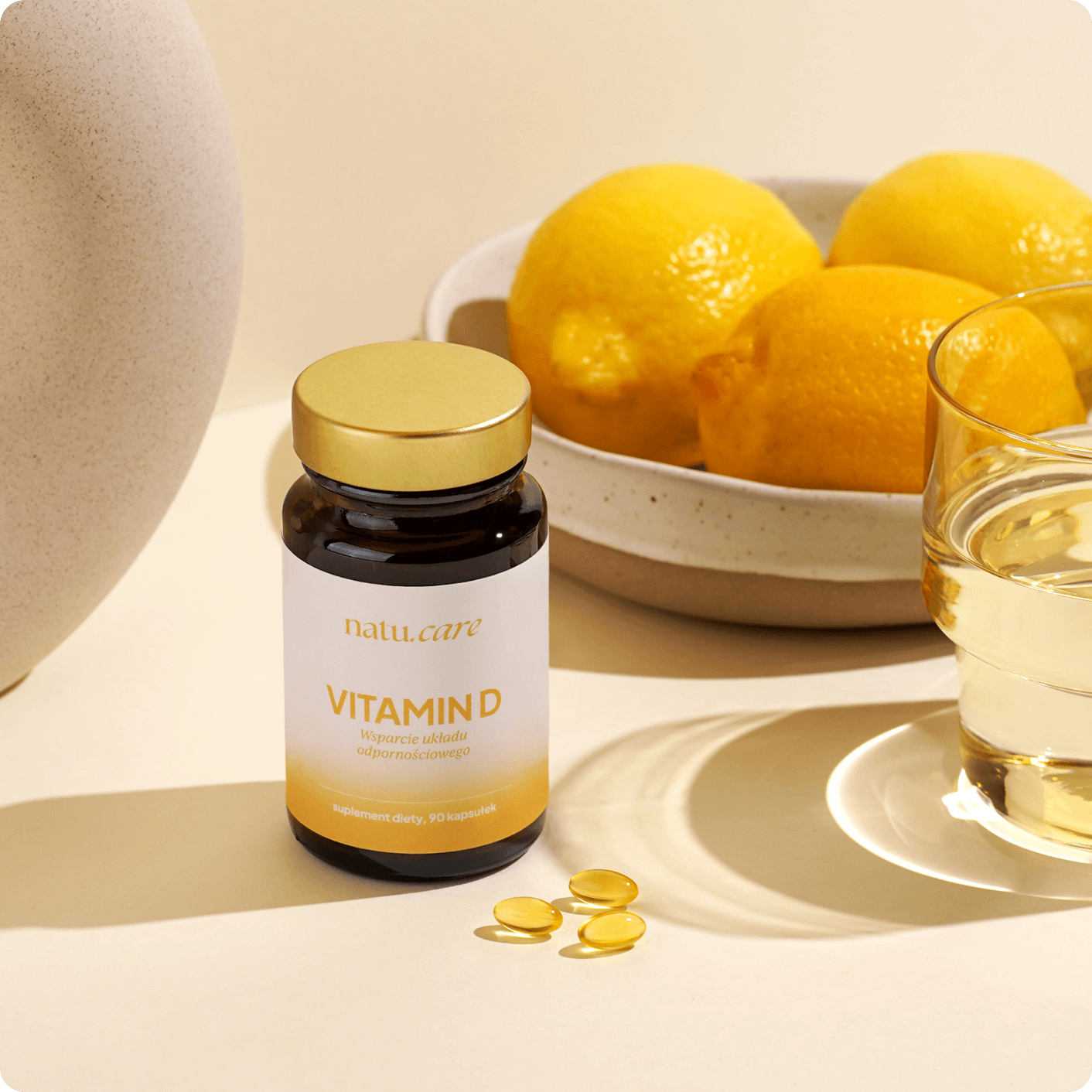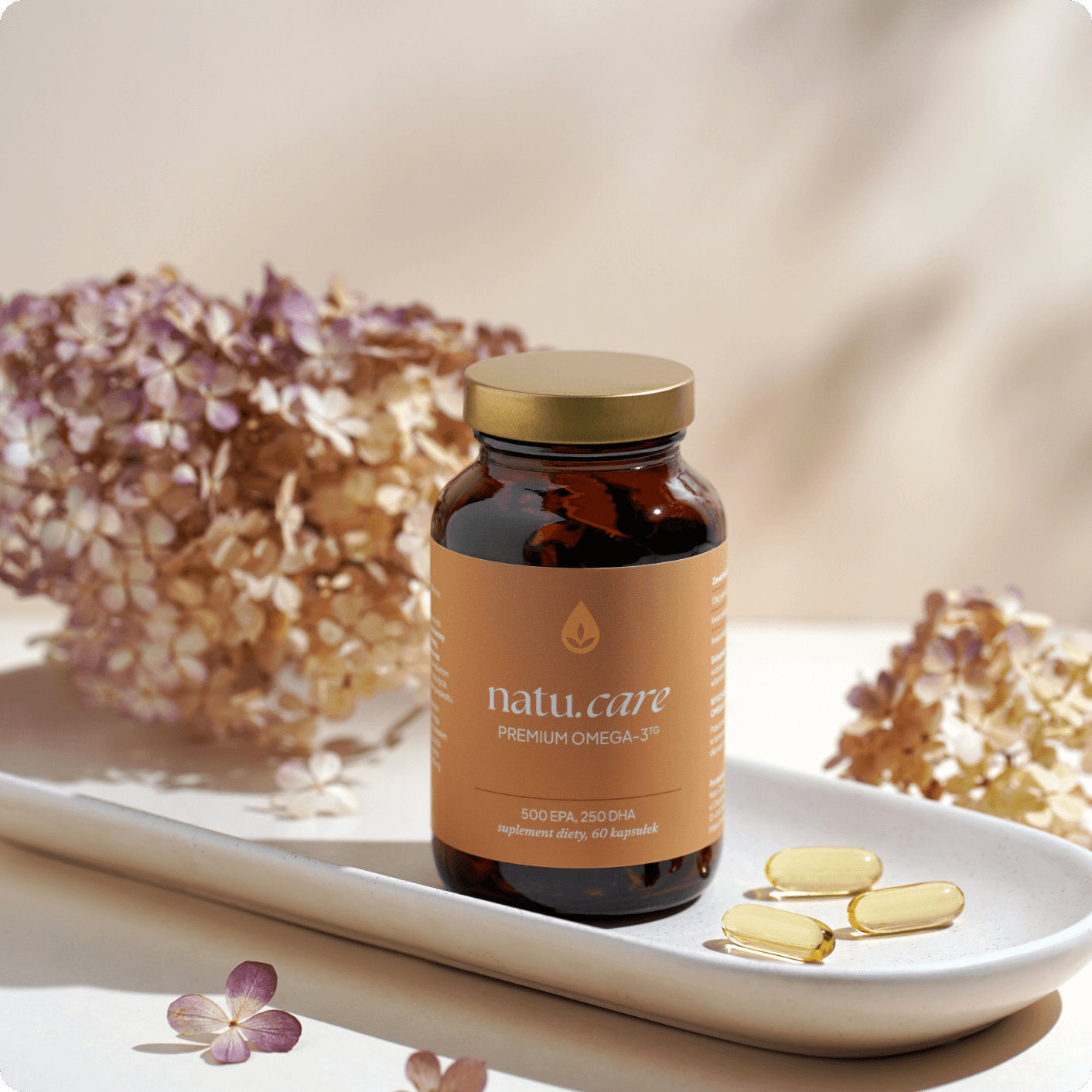
Only 20% of our daily vitamin D requirements can we realistically take in from the diet?
Vitamin D plays a key role for our health and well-being. It influences calcium and phosphate metabolism, which translates into healthy bones and teeth. It also helps regulate the immune system, and studies also indicate its impact on nervous system function.
In Poland, researchers describe vitamin D deficiency as a "population problem." Its daily supplementation is therefore indicated - including in spring and summer.

Vitamin D, although called a "vitamin," is actually a prohormone that our body produces on its own, primarily when exposed to sunlight.
Unfortunately, our modern lifestyle promotes deficiencies of this key vitamin for our health and well-being. Working in closed office buildings, using (needed!) SPF creams, covering the body with clothes - all this makes it very difficult, and sometimes impossible, to provide adequate levels of vitamin D from the sun. That's why adequate, year-round supplementation is so crucial.
Remember: UVB radiation does not penetrate through glass, so unfortunately vitamin D will not be produced when working with the window closed or driving.

- high bioavailability
Soft capsules (softgels) filled with vegetable oil from Safflower ensure the best solubility and bioavailability of vitamin D3. - safe ...because tested.
Vitamin D from Natu Care is 100% tested, and you will find only the highest quality raw materials. It does not contain mold, yeast, bacteria as well as heavy metals. The tests were performed in an independent, certified laboratory of J.S. Hamilton Poland, which meets the highest quality standards. - with verified sources of raw materialsVerified, top European suppliers of active ingredients.
- with natural ingredients
The short and clear composition guarantees the highest quality of the product. We suspended our Vitamin D in natural safflower vegetable oil. No added sugar, gluten, GMOs, lactose and no preservatives or colors.

Vitamin D is an organic chemical compound in the vitamin D group that is fat-soluble. It has a huge impact on human health. It is primarily responsible for regulating calcium and phosphate metabolism, that is, balancing the calcium/phosphorus ratio in the body. Maintaining optimal vitamin D levels is important for bone health, the immune system and overall well-being.Source:
https://wydawnictwo.umed.pl/wp-content/uploads/2021/12/MONOGRAFIA_12_2021.pdf

Collagen is not everything when it comes to skin, hair and nail health. Additional support will be provided by biotin, folate or silicon, among others - active substances you will find in Glow Stories capsules. Add to your order now!

Vitamin D3 is a very important element for ensuring the health of our bones. Due to the hormonal changes that occur in our bodies over the course of our lives, we women should take special care of its proper levels in the body. During menopause there is a drop in estrogen levels which promotes calcium absorption disorders. Vitamin D3 will help in its absorption, and thus will act as a preventive against the onset of osteoporosis. It is worthwhile to do blood tests and determine the level of the "sunshine vitamin" regardless of the season, in case of deficiencies, after medical consultation to include the appropriate supplementation.
Kamila Grabek
Physiotherapist
Can I combine Natu Care vitamin D with other dietary supplements?
Natu.Care Vitamin D can be combined with other dietary supplements. However, before you do so, check the composition of our product and your other supplements carefully to ensure that you do not significantly exceed your intake of specific vitamins and minerals. If in doubt, consult your doctor.
It is not recommended to take vitamin D3 at the same time along with vitamin A and E and with products that are high in fiber. Such combinations impair the absorption of vitamin D.
.Has the vitamin D from Natu Care been tested?
We put the safety and quality of our products first!
Vitamin D has been tested for the presence of mold, yeast, bacteria, as well as PAHs and heavy metals (lead, cadmium, mercury).
We have also tested our product for the absence of gluten, lactose and GMOs.
The tests were performed at the independent, certified J.S. laboratory. Hamilton Poland - we do not hide the results, they have been published in full on this page under "test results".
Can pregnant or breastfeeding women take this dietary supplement?
Yes, but they should consult supplementation with a health care practitioner.
Although the formulation includes ingredients with only beneficial effects, women who are breastfeeding or pregnant should coordinate the use of the product with a health care practitioner.
When is it best to take Vitamin D - in the morning or in the evening?
The perfect time to take vitamin D may be at the first meal. You can take vitamin D at breakfast, for example, with a sip of water. Vitamin D should not be taken in the evening, as it can interfere with the production of melatonin, the hormone responsible for sleep.
What are the symptoms of vitamin D3 deficiency?
The most common symptoms of vitamin D3 deficiency are frequent infections, general fatigue, bone and muscle pain, muscle cramps, lowered mood, apathy, depressive moods, sleep problems (insomnia, decreased quality and length of sleep), long wound healing time.
Can vitamin D be overdosed?
Yes, you can overdose on vitamin D3 and it is called vitamin D hypervitaminosis. This most often occurs as a result of over-supplementation and exceeding daily doses.
Vitamin D3 alone, in the proper dose, does not cause side effects. Ingesting excessive amounts of vitamin D3, however, can cause: headache, nausea, vomiting, constipation, increased thirst, frequent urination, worsening of appetite, weakness.
How much vitamin D should one take daily?
The daily requirement for vitamin D3 depends on a number of factors (e.g., health status, age). The average adult should supplement 2,000 IU of vitamin D3 daily, and 4,000 IU during times of higher demand (such as winter or in the elderly).
What is the difference between vitamin D3 and D?
When we write about vitamin D, we mean a group of fat-soluble organic chemical compounds. This includes vitamin D2 (ergocalciferol), found in plants and fungi, and vitamin D3 (cholecalciferol), found naturally in the skin tissue of humans and animals.
What does vitamin D3 help with?
Vitamin D3 helps absorb calcium and phosphorus, which is crucial for bone health, supports immunity to fight infection, strengthens muscles and promotes muscle recovery, plays an important role in brain development, can prevent dementia and Alzheimer's disease, and reduces the risk of cardiovascular disease.
What are the causes of vitamin D deficiency?
The most important causes of vitamin D deficiency are:
insufficient sun exposure - it is produced in the skin as a response to UVB radiation and when you spend too little time in the sun, you provide too little of the right stimulus;
deficiencies in your diet - reach more often for, among other things. for eggs, cheese and oily fish;
age - older people have less ability to produce vitamin D and absorb it from food;
absorption problems - these can be caused by conditions such as Crohn's disease, celiac disease or pancreatic insufficiency;
dark complexion - melanin reduces the skin's ability to produce vitamin D;
overweight and obesity - vitamin D stored in fat tissue is less available to other tissues.
Is vitamin D calming?
Research shows that low levels of vitamin D can increase symptoms of anxiety, fear, depression and stress. This is also linked to the fact that vitamin D and omega-3 fatty acids regulate the production of serotonin, a neurotransmitter that affects our emotions, mood, concentration and memory, among other things.




